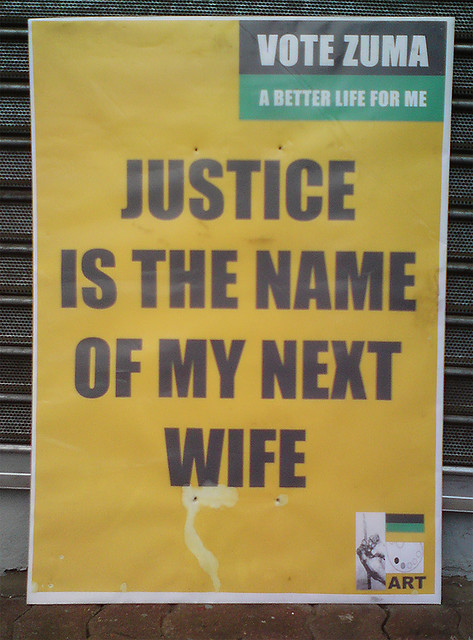Source: ironic anti-Zuma poster found in north western suburbs of Johannesburg prior to the 2009 election, by Christo Doherty
Monkey still working. Baboon gotta wait small: Muyatwa Sitali presents his pick of recent election slogans from across Africa.
Podcast of the week: The Guardian’s global development podcast: spotlight on the battle against global poverty
Confessions of a banker: Why I am leaving Goldman Sachs. It’s not everyday that a former executive director of one of the most successful firms in the investment banking industry accuses their former employer of having a ‘toxic and destructive’ environment or reflects on ‘decline in the firm’s moral fiber’ in an open letter to the New York Times. Ouch!
Most boring headline of the week:
$500m of US food aid lost to waste and company profit, says Oxfam
Surely the swirling deadline-bound fast paced newsrooms of The Guardian could have packaged the alarming waste in money and trading opportunities for Third World workers with the kind of concern that the situation demands?
Here are some examples of the kinds of headlines that could (or should?) have been used:
• Tied-aid holds poorest countries to food ransom
• US protectionist food aid programmes subsidises unjust financial and human costs Congress must stop profit-driven food aid schemes before it’s too late!
• Timely Oxfam report reveals the state of unfair tied food aid economy
Feel free to come up with your own news headline for this report.
Should we celebrate a decline in global poverty?
Do criticisms matter on the findings of antipoverty World Bank progress?
The World Bank’s Martin Ravallion ruefully ponders the fate of researchers on poverty – someone is always going to object to your findings:
There have also been signs of a “political cycle” in the critiques. When our up-dates (at three-yearly intervals) [of global poverty numbers] find little (or seemingly modest) progress against poverty, some of our more right-leaning critics come up with some argument as to why we are systematically underestimating that progress. The left-leaning critics are more accepting at these times. By contrast, when we find progress, such critics come up with arguments as to why we are over-stating that progress. We don’t get much critical attention from the right at these times.

